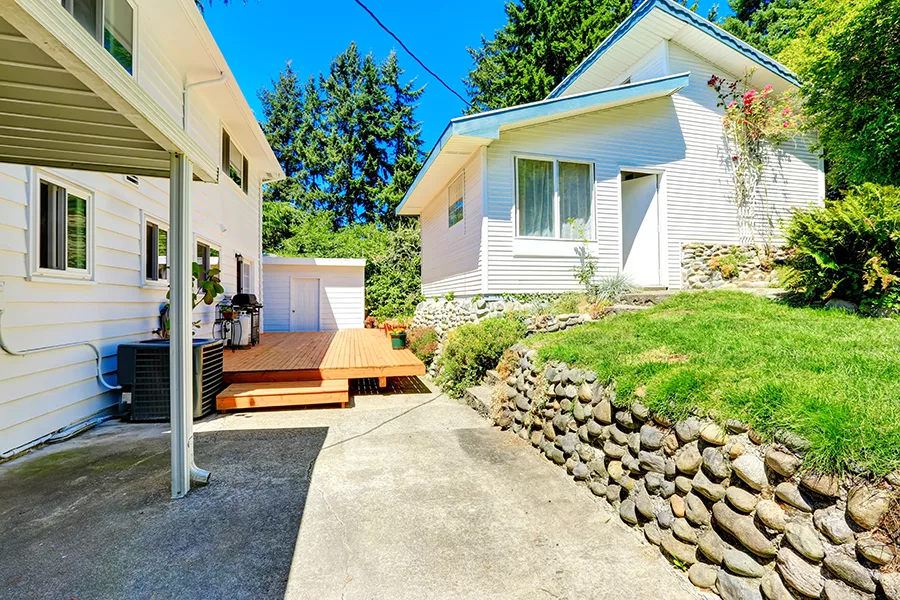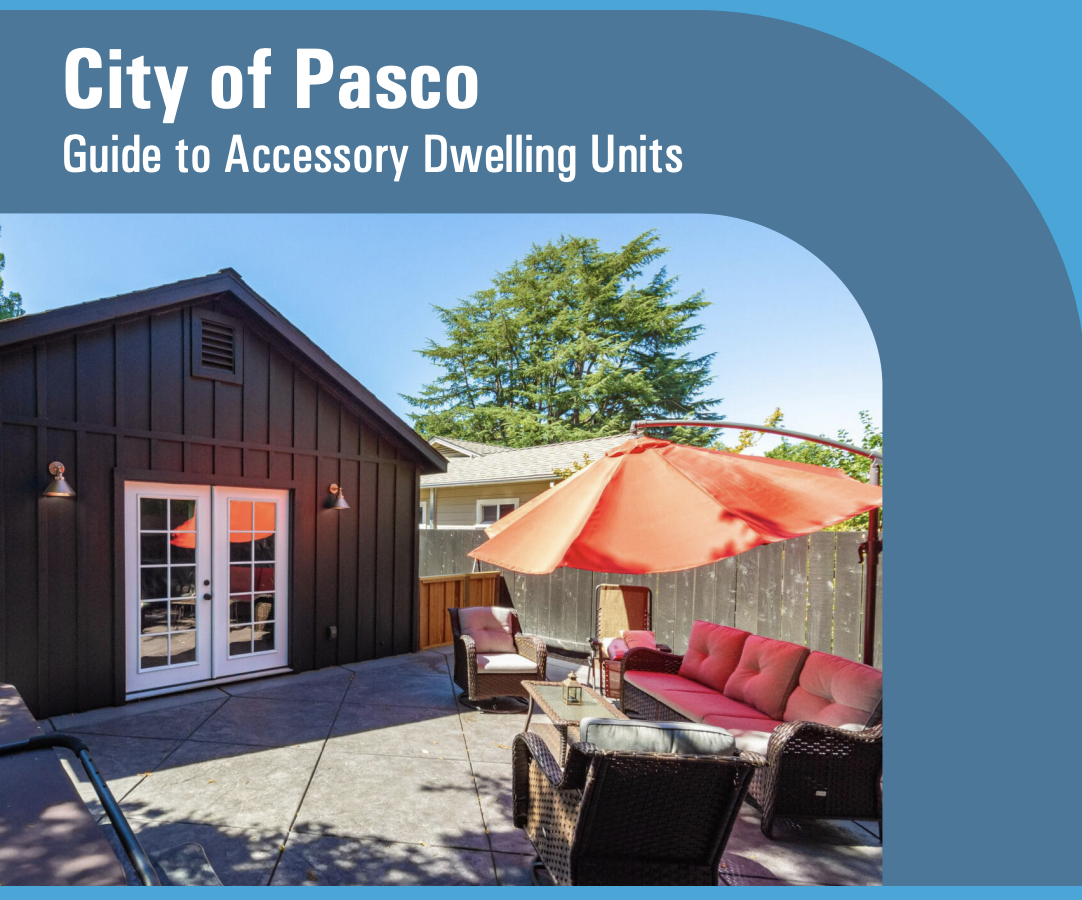
Home » Will ADUs help with Tri-Cities housing squeeze?
Will ADUs help with Tri-Cities housing squeeze?

August 14, 2023
It’s a scenario that’s growing increasingly common across the state:
“I’m thinking of building a guest home/mother-in-law suite in my backyard,” a woman wrote recently in a local online group, asking for advice on how to start the process and a general picture of the cost.
She signed off by saying, “(I’m) hoping our city codes let us.”
The woman lives in West Richland, but others in the Tri-Cities and across Washington are grappling with those same questions as the demand for more diversified and lower-cost housing options grows.
One of those options is an accessory dwelling unit, or ADU, sometimes called a “mother-in-law apartment” or “backyard cottage.” An ADU can be attached to or detached from a main residence; it’s a small, self-contained unit on the same lot as a single-family home.
ADUs are often used for relatives of the property owner, from young adults just starting out to aging parents or grandparents. But they’re increasingly becoming an option beyond family as well, especially as communities across the country continue to feel a housing squeeze.
Interest in ADUs is exploding on the west side, particularly in Seattle, which updated its ADU rules in 2019.
It remains to be seen whether there will be similar demand in the Tri-Cities, although Pasco has seen a significant increase in ADU permit applications since it changed its ADU rules last year.
While that city is ahead of the pack locally when it comes to easing the path for ADUs, Kennewick is in the process of making its own code changes. And a new state law loosening ADU regulations means other local jurisdictions will be making adjustments to their rules in the next few years.
“I don’t know if the need is the same as in King County. It’s a different ballgame over there,” said Steve Donovan, planning manager for the city of Kennewick. But the coming changes “are definitely going to open some doors for people who want to do an ADU. It’s going to make it easier to have them.”
New state law
The state Legislature earlier this year approved a bill that eases regulations around ADUs.
Among the changes: two ADUs are now allowed on lots that meet requirements; ADUs don’t have to be smaller than 1,000 gross square feet; local governments can’t impose setback requirements and similar restrictions on ADUs that are more severe than for the principal unit; and the property owner isn’t required to live on the lot that’s holding the ADU or ADUs.
Cities and counties don’t have to update their codes right away; that’s not required until six months after the local government’s next periodic update of its comprehensive plan.
In Seattle, ADUs are becoming more and more common.
Last year, the city issued nearly 1,000 permits for ADUs, an all-time record, according to the city’s annual ADU report. The permits were fairly evenly split between detached and attached ADUs.
What about the Tri-Cities?
In the Tri-Cities, Pasco may be a bellwether of how greater ADU flexibility will look here.
Like Seattle, that city has seen a spike in the number of ADU permit applications since it made sweeping changes to its ADU rules. Those changes, done in early 2022, were part of a slate of code updates aimed at removing barriers and creating more housing opportunities.
“Since that time, we’ve been operating on a substantially more flexible and modern zoning code,” said Jacob Gonzalez, community and economic development director. Because of the changes, the ADU rules already are largely aligned with the new state law and are even more flexible in some areas, he said.
The city has received 41 applications for ADUs since its code update, which is a “significant” increase over the application numbers from before the changes were made, Gonzalez said.
The city also worked with the engineering and planning firm AHBL to create a guide to ADUs in English and Spanish. The guide explains the different types of ADUs and provides an overview of the process.
 Pasco's user guide was produced in 2023 to help residents in the city of Pasco apply for accessory
Pasco's user guide was produced in 2023 to help residents in the city of Pasco apply for accessory
“It’s been flying off the shelves. Even though we simplified the code, it’s still municipal code. The guide is written in plain and simple language versus the planning and technical jargon,” Gonzalez said.
Although it’s not as far along as Pasco, the city of Kennewick already was looking at updating its ADU rules and now is folding in the requirements needed under the new state law.
“We’ll be changing our code pretty extensively,” said Donovan, the planning manager. “Currently, we have quite a few restrictions in regards mainly to detached units – in terms of size, how they’re supposed to look, who can live in them, number of bedrooms, minimum lot sizes,” he said.
He anticipates public hearings in the fall and consideration by the city council by early next year.
Donovan said he’s not sure whether the city will see a glut of applications once the rules change.
“I don’t know if it’s going to be this huge product that everybody is moving to. I think it’s going to be helpful for family members who want to provide that accessory structure,” he said.
In Richland, the city sees a handful of ADU applications a year, said Mike Stevens, planning manager. They’re typically for property owners who want to add housing for relatives, and Stevens expects that to continue being the prevailing use as the rules change.
Richland will have to make changes to its code around ADUs to bring it in line with the state updates. West Richland – where the citizen made the ADU inquiry in an online group – also will need to make changes. Both cities are set for their next periodic comprehensive plan updates in 2026.
‘Beef up options’
Gonzalez, from Pasco, said housing is a pressing need in his city and beyond.
Pasco has a population of about 81,000 people, according to the latest state estimate, and another 50,000-or-so residents are expected to be added in the next roughly 20 years.
“In the very near future, Pasco will be home to over 100,000 residents. Our other neighboring communities of Richland, Kennewick and West Richland are also going to see significant growth. So, if we’re under supply right now, we need to beef up those options available for folks,” Gonzalez said.
Pasco is working to do just that. Along with updating its ADU rules, the city also made code changes last year that added flexibility in housing types and lot sizes.
And it’s working on a Housing Action and Implementation Plan, among other efforts.
The city has received recognition for its work to address housing challenges, including winning a 2022 Municipal Excellence Award from the Association of Washington Cities.
In Gonzalez’s view, ADUs are a tool in the toolbox.
“They offer a flexible option for residents to provide housing at their own discretion. If they want to have an ADU for their grandmother, or for their parents as they age in place, or for their children who are having trouble finding private market housing, (it’s an option),” he said. “It’s an opportunity to keep families and neighborhoods intact. To have the opportunity to keep your family in the same neighborhood, that’s pretty cool.”
Real Estate & Construction Local News
KEYWORDS august 2023





